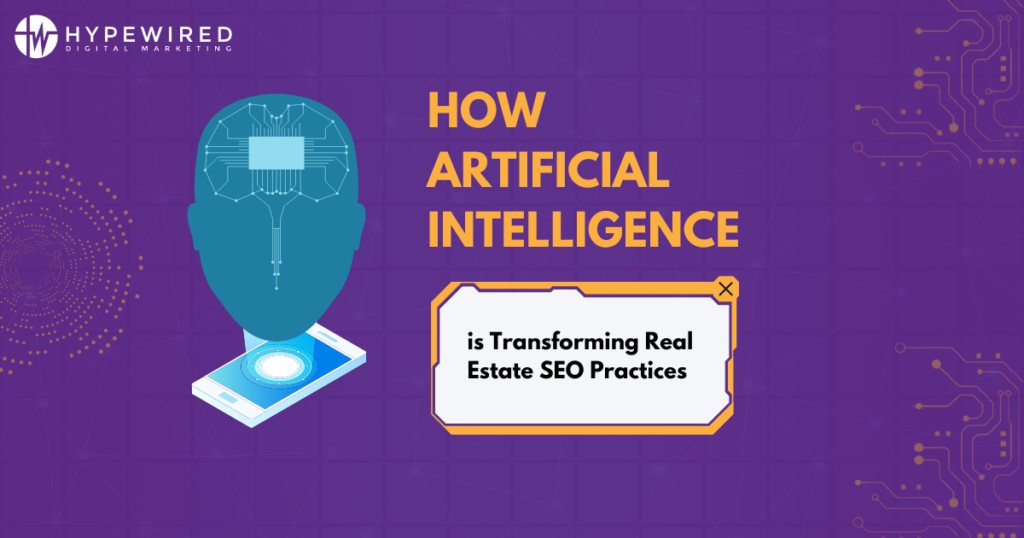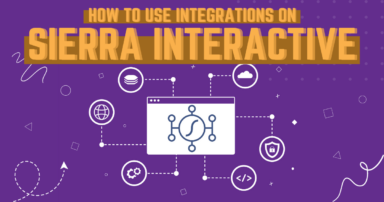How Artificial Intelligence Is Transforming Real Estate SEO Practices
The real estate industry is currently experiencing a digital revolution, thanks in part to the advent of artificial intelligence (AI). With its widespread adoption, AI has transformed various aspects of marketing, including search engine optimization (SEO) practices.
Nowadays, many real estate professionals are turning to AI to boost their online visibility and engagement. In this article, we’ll explore the ways in which AI is revolutionizing SEO practices in the real estate sector and why this technology is becoming increasingly vital for modern real estate agents.
Definition of AI in Real Estate
AI is a broad term that encompasses many facets, including machine learning, computer vision, natural language processing, and more. All these technologies have enabled businesses to automate complex and repetitive tasks such as decision-making processes or customer service operations.
At its core, AI technology can be understood as a set of algorithms and techniques used by machines to simulate human behavior without explicit programming instructions. This allows them to identify patterns from large sets of data faster than humans ever could.
With this capability comes unprecedented opportunities for brokerages looking to optimize their online presence through better search engine rankings, improved user experience on websites, and time-saving automation. We’re already seeing AI chatbot lead generation, AI real estate appraisal, and more.
Benefits to Real Estate SEO Practices
A major benefit of using AI for real estate SEO is its ability to quickly optimize a website’s content according to current best practices. Through analysis of the target audience and trends in online searches, an AI algorithm can be used to automatically customize important SEO elements such as title tags and meta descriptions so as to attract more visitors from relevant queries.
Furthermore, through AI-optimized keyword research tools and analytics dashboards providing insights into user engagement metrics, SEO practitioners can quickly identify opportunities for improvement within their campaigns.
AI also has applications in content marketing and real estate blogging. As AI technology develops, we’re seeing ever-more-sophisticated AI writers that can automatically analyze the top competing content for target keywords and generate content for a human editor to optimize for their audience.
Real estate SEO professionals are no longer limited by slow manual processes creating optimized content; instead, they now have access to powerful technologies that do much of the heavy lifting. By taking advantage of these advanced solutions, businesses can ensure better performance on SERPs and take their marketing efforts to the next level.
Challenges and Limitations of AI in Real Estate SEO
The integration of AI into real estate SEO offers a number of advantages, yet it is not without its challenges and limitations.
First and foremost among these challenges is the complexity of AI development itself. As with any other form of machine learning, AI requires a lot of data to learn from and become effective. The sheer volume and variety of data needed means that development can be costly and time-consuming for companies that do not already have access to vast amounts of resources.
Additionally, many organizations still lack the necessary technical expertise to implement an AI-driven SEO strategy correctly. This can lead to short-term gains that may not yield long-term benefits due to poor implementation techniques. AI hasn’t yet reached the level where real estate agents can confidently leave everything in the AI’s figurative hands. For example, employing an AI writer without a trained human editor will inevitably lead to low-quality or even outright incorrect content, which will be penalized accordingly by search engines.
Concerns about the ethics and quality of AI-produced content have led several developers to encode digital “watermarks” into their AI products, which will help crawlers identify primarily AI-written content.
Impact of AI on the Real Estate Industry
The potential of artificial intelligence to transform SEO practices within the real estate industry is undeniable. AI has already revolutionized many aspects of the industry, from marketing and advertising to customer service. AI’s impact on the real estate sector extends far beyond traditional SEO tactics.
Real estate companies are using machine learning algorithms to automate property listings, analyze consumer behavior, monitor competitors’ activities, predict market trends, optimize pricing strategies, and generate insights into important customer segments.
By leveraging AI-based analytics tools, organizations can gain valuable insights into customer preferences that can be used to further refine their digital marketing efforts. In addition, AI-driven automation enables agents and brokers to streamline everyday tasks such as responding to common inquiries or listing properties online without requiring manual intervention. This allows them to focus their time on higher-value activities like client acquisition instead.
By embracing advanced technologies along with other forward-thinking strategies, real estate firms can gain a significant competitive advantage over those who do not—ultimately allowing them to provide superior services at lower costs than ever before seen in this highly saturated industry segment.
Future of AI in Real Estate SEO
The future of AI in real estate SEO is an exciting prospect. Artificial intelligence has been shown to be a powerful tool for optimizing search engine performance, and its use is becoming increasingly common among modern businesses. As the technology advances, so too do the opportunities it presents to enhance SEO practices within the real estate sector. One thing’s for sure—when it’s already this useful, it’s not going anywhere anytime soon.
With responsible implementation, combining an AI foundation with the human touch, real estate professionals can create more engaging, relevant content that will be better received by their target audience. They can optimize their pages to help search engines put them in front of the audiences most likely to become qualified leads. Finally, machine learning models can be used to assess user behavior on websites and make data-driven decisions about how to keep improving.
Real estate professionals who embrace AI have a unique opportunity to stay ahead of the competition with innovative solutions tailored specifically for the industry. By leveraging this powerful technology, they can ensure their website remains visible while quickly adapting to changing trends and customer needs in order to remain competitive in today’s digital landscape. In short, embracing artificial intelligence as part of an effective SEO strategy is essential for success in today’s ever-evolving online marketplace.
Frequently Asked Questions
What Are the Most Effective AI Tools to Use for Real Estate SEO?
There’s no one-size-fits-all AI solution for real estate (yet); the best tools for your toolbox depend on what you need to accomplish. AI tools are generally specialized toward specific tasks. Ahrefs is a powerful AI-based analytics tool that can help you brainstorm new ideas and provide you with feedback on what’s working, but it doesn’t have tools to actually create new content. Likewise, Jasper can get you past the writer’s block, but it doesn’t have analytics tools.
You might find yourself employing multiple AI solutions for the same task, even. Longform AI writers like Content at Scale can be complemented by AI writers that can paraphrase small sections of content like QuillBot or even ChatGTP. You’ll have to experiment with what works best for the tasks you need to accomplish.
How Can AI Help Real Estate SEO Professionals Better Target Their Audience?
Audience targeting strategies should focus on leveraging data from multiple sources such as search engine algorithms, consumer behavior patterns, and sentiment analysis in order to identify potential opportunities for improvement. AI makes finding and analyzing the data a much easier task.
AI-driven targeting can provide insights into customer preferences and trends which can then be used by SEO strategists to craft more effective campaigns. In addition, using real estate targeting analytics helps marketers gain valuable insight into how different audiences interact with their content so they can make adjustments accordingly.
- Use keyword research to optimize your content—discover what potential customers are searching for and create content that answers their needs
- Analyze user engagement metrics regularly in order to adjust your approach based on performance
- Take advantage of machine learning capabilities offered by leading providers such as Google Ads or Bing Ads in order to refine your ad targeting
In an increasingly competitive landscape where every second counts, having the right technology at your fingertips makes all the difference when it comes to achieving desired outcomes. By taking advantage of cutting-edge technologies like AI-driven marketing automation solutions, real estate SEO professionals have access to powerful tools that enable them to target their audience more effectively while also gaining invaluable insights about customer behaviors and preferences along the way.
Is Using AI For Real Estate SEO Ethical?
As AI automation makes SEO ever faster, it’s understandable to be worried about things falling through the cracks. However, when used responsibly, there should be no ethical concerns about using AI for SEO. Real estate professionals just have to be aware of the potential pitfalls to avoid them.
For instance, some experts have raised questions about whether it’s socially responsible for companies to use AI algorithms that may favor certain types of content over others based on predetermined criteria or biases inherent within them. While this remains largely unresolved at present, it serves as an important reminder that careful thought needs to go into any decision regarding the use of AI in marketing contexts.
In addition, the potential for AI to produce misinformation at scale means that the human element is unlikely to be rendered obsolete in the foreseeable future. It’s the responsibility of any agent using AI to ensure that the final results remain accurate.
How Much Does it Cost to Implement AI In Real Estate SEO?
The cost of AI real estate tools can be looked at through several lenses: the initial investment cost, the costs you save in time and labor, the opportunity costs of falling behind the technology curve, and more. Many AI tools use subscription-based models, often with multiple levels of service to fit different budgets.
Your cost/benefit analysis and the tools you decide on will depend on your individual situation, but investing in implementing and learning to use AI tools for real estate SEO will provide long-term monetary benefits.
Successfully incorporating AI into your real estate SEO strategy can provide tangible results by improving efficiency, accuracy, search rankings, and customer experience—all leading to increased profits over time. However, when investing in this technology, it’s important to do your research beforehand so you have a realistic expectation of both short-term investments and long-term returns from utilizing AI solutions within your business model.
How Long Does It Take For AI-Driven SEO Strategies To Start Showing Results?
When implementing AI-driven SEO into your workflow, there are several factors that come into play when determining how quickly results can be expected from the new system. It’s important to note that each situation is unique and depends on a variety of variables, such as website structure, current keyword rankings, market competition, etc.
Tangible benefits may begin appearing within weeks or months, depending on the complexity of the project. You might see quick gains for things like low-competition keywords. However, to really see organic progress, be prepared for the long haul. SEO results may take six months to a year to start showing up.
The ideal SEO candidate is prepared to continually invest in improving SEO, because while it takes a while to build up momentum, once it starts, your site can become an invaluable long-term asset.
Work Smarter With AI-Driven SEO
The use of artificial intelligence in real estate SEO has revolutionized the way content marketers are able to target their audience and reach more potential customers. By taking advantage of AI’s ability to quickly analyze data and make decisions based on that data, real estate professionals can create a more powerful online presence with far less effort than ever before.
However, there is still much to consider when incorporating AI into your marketing strategy. Not only do you need to take ethical considerations into account, but you also need to understand the associated costs and timeframes for implementation. For better or for worse, AI is here to stay, and the real estate professionals who can successfully adapt to it are poised to reach unprecedented heights.

 December 1, 2022
December 1, 2022



